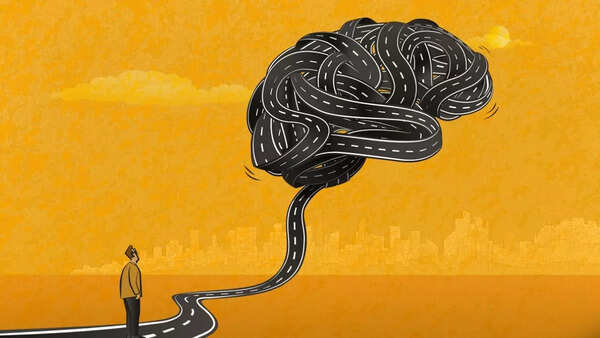According to the World Health Organisation, over 57 million people worldwide were living with dementia as of 2021. While Alzheimer’s typically shows up much later in life, what often slips through the cracks are the subtle changes that begin to appear years—sometimes decades—before a formal diagnosis.There’s a tendency to brush off certain symptoms in the 40s as stress, aging, or simply being too busy. But what if some of these signs are the brain’s early warning system? What if they are telling a story that the body hasn’t fully caught up with yet?Experts like Tyler Bradley, a brain and body coach, suggest that early brain inflammation, metabolic stress, and sleep dysregulation may quietly lay the foundation for neurodegenerative issues. Here are 3 symptoms that don’t raise red flags—but maybe should.
Brain fog that feels too persistent to ignore
Everyone forgets things once in a while—keys, names, what someone just said. It’s normal, right?Consistent brain fog—difficulty focusing, losing the thread mid-conversation, or constantly searching for words—can signal early neurological inflammation. It’s not just about being tired or stressed.Recent neuroscience points to poor glucose regulation in the brain as one of the causes of this foggy state. The brain, being an energy-intensive organ, suffers deeply when insulin resistance or metabolic syndrome sneaks in during midlife. It doesn’t scream—it whispers, in the form of forgetfulness that feels just a little too frequent.

Alzheimer’s disease is a brain disorder that slowly destroys a person’s memory and thinking skills. It is a progressive neurological disorder that causes the brain to shrink (atrophy) and brain cells to die. This disease leads to a loss of cognitive functioning, such as thinking, remembering, and reasoning, along with behavioural abilities, to the point where it disrupts a person’s daily life and routines.
Emotional reactivity that’s new and unexplained
Life gets more stressful in the 40s. Kids, jobs, aging parents—it’s natural to feel on edge.A brain that’s overwhelmed metabolically becomes more reactive emotionally. When tiny stressors begin triggering big emotional waves—irritation, anxiety, even sadness—it’s worth pausing.This change isn’t always external. The nervous system may become more sensitive because of inflammation in the microglial cells—the brain’s immune defense team. This means the emotional thermostat is broken, and the brain is operating in survival mode far more often than it should.

Everyday drinks can feel harmless, comforting, even. A chilled diet soda after a long day, a sugar-loaded coffee to push through work, or a glass of skim milk at bedtime. These seem like small indulgences. But when science speaks, it’s worth listening—especially when it’s about the brain
Restless sleep that feels more like survival than rest
Everyone wakes up at 2 am sometimes. Maybe it’s just hormones, or drinking water too late.The brain uses deep sleep to clean itself through a system called the glymphatic system. When that gets disrupted, toxins build up—especially amyloid plaques, which are strongly associated with Alzheimer’s.Waking up in the middle of the night feeling wired, or sleeping 8 hours and still waking up tired, could mean the brain is missing the deep restorative states it needs. This isn’t always insomnia—it’s often neurochemical imbalance from a system that’s struggling to regulate itself.























































